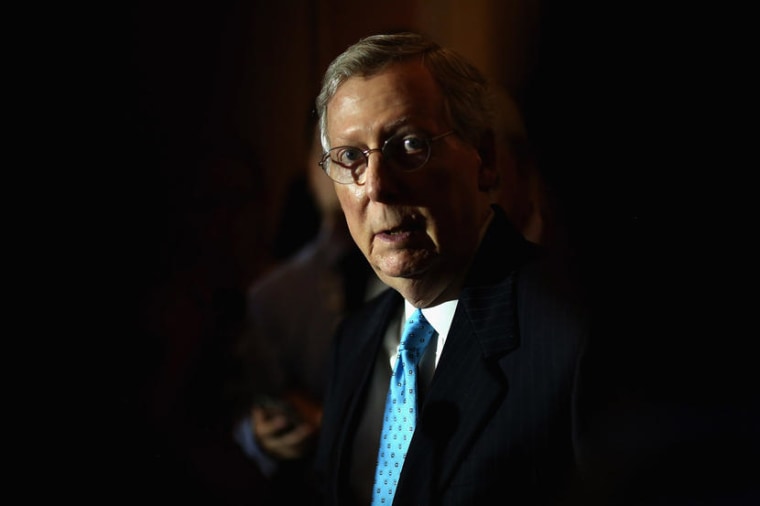The Courier-Journal in Louisville this morning reported on an unfortunate comment from Congress' top Republican.
Senate Majority Leader Mitch McConnell said Tuesday that the impeachment trial of President Donald Trump slowed down his administration's response to the coronavirus global public health crisis. "It came up while we were tied down in the impeachment trial," McConnell told radio host Hugh Hewitt. "And I think it diverted the attention of the government because everything every day was all about impeachment."
It's tempting to argue that this could be seen as a rather brutal criticism of Donald Trump from McConnell: perhaps if the president hadn't abused the powers of his office and launched an illegal extortion scheme, the argument goes, the administration's attention wouldn't have been "diverted."
That said, I have a hunch that's not where the Senate majority leader was going with this.
There's no shortage of problems with McConnell's actual pitch. As the senator probably knows, for example, developments of global importance are not paused during White House scandals, and presidents and other leading American officials must be able to focus on more than one responsibility at a time. Trump's impeachment may have been important, but it was not all-consuming.
For example, Donald Trump found time to play golf several times between mid-January and early March, suggesting the impeachment ordeal did not dominate his attention to such a degree that he couldn't focus on other priorities.
What's more, the timeline of events matters: the Senate's impeachment trial ended on Feb. 5, at which point the president and his team could've focused on substantive concerns, but they instead turned their attention to an agenda of retaliation against Trump's perceived enemies. It wasn't until five weeks later that he declared a national emergency in response to the coronavirus crisis.
To hear McConnell tell it, the pandemic threat was somehow overlooked because of impeachment, but the calendar suggests otherwise.
Let's also not forget that while much of the political world watched the Senate trial in January, there were plenty of administration officials whose focus on unrelated threats remained the same. The Washington Post published this report nearly two weeks ago.
U.S. intelligence agencies were issuing ominous, classified warnings in January and February about the global danger posed by the coronavirus while President Trump and lawmakers played down the threat and failed to take action that might have slowed the spread of the pathogen, according to U.S. officials familiar with spy agency reporting.
And that, by any fair estimation, was not the result of impeachment.
The larger point is hardly subtle: Mitch McConnell appears eager to come up with a way to hold Democrats responsible, at least in part, for the ongoing crisis. This, evidently, is what the Kentucky Republican has come up with.
The facts suggest the GOP leader will need to come up with something else.
Postscript: For the full context of this morning's comments, Hewitt posted a transcript of today's McConnell interview online.
